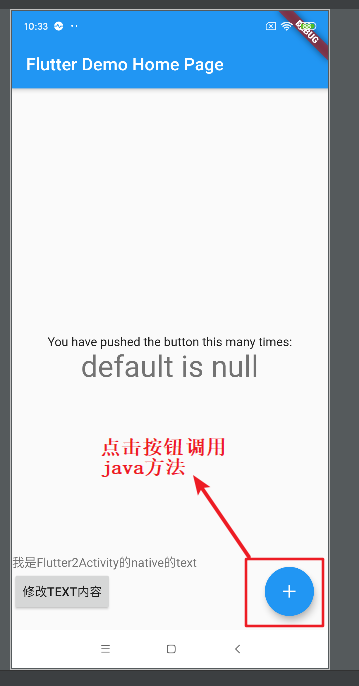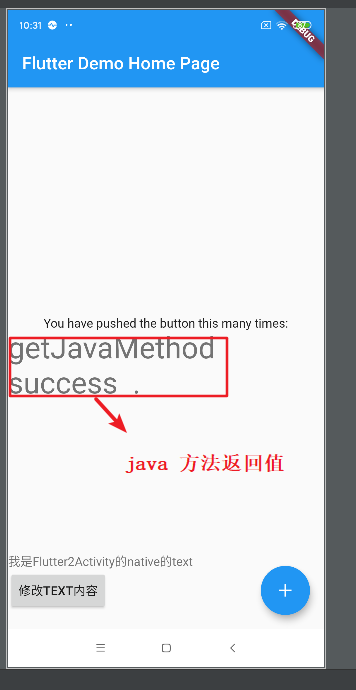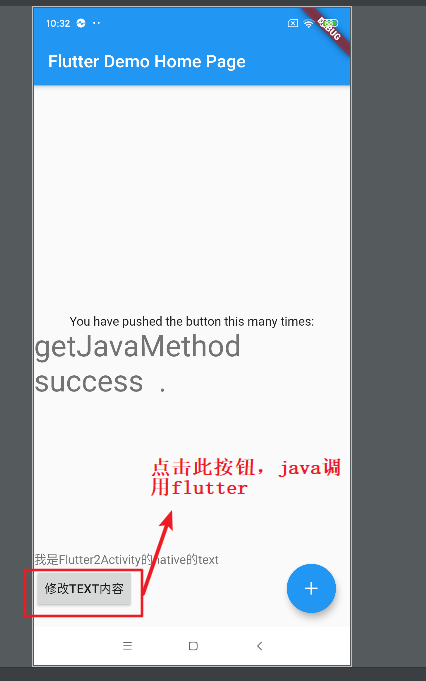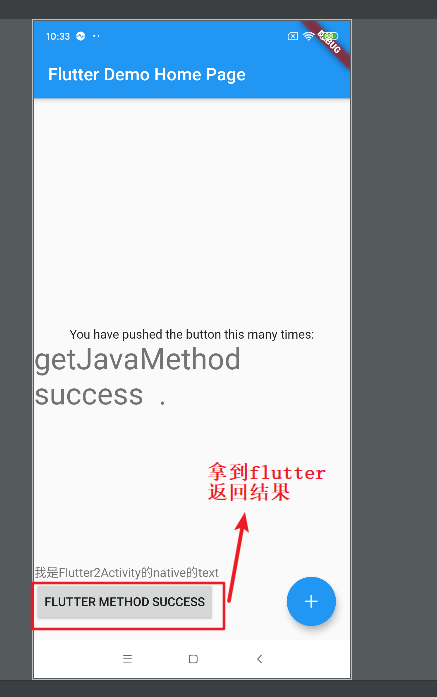flutter调用android
1,创建flutter消息通道
mFlutter2MethodChannel = new MethodChannel(flutter2Engine.getDartExecutor(), "flutter2/flutter2Java");//字符串的含义跟JsBridge中的js和native互相调用的含义差不多,flutter中要是用这个消息通道时,也要设置为一样的
mFlutter2MethodChannel.setMethodCallHandler(new MethodChannel.MethodCallHandler() {
@Override
public void onMethodCall(MethodCall call, MethodChannel.Result result) {
if (call == null || result == null){
if (result!=null){
result.error("-1","MethodCall is null",new Exception("MethodCall is null"));
}
return;
}
if ("getJavaMethod".equals(call.method)){
result.success("success ");
} else {
result.success(" unKnow");
}
}
});
2,flutter调用native方法
static const platform = const MethodChannel("flutter2/flutter2Java");//跟安卓代码中设置的通道名称字符串一样
Future<Null> _getJavaMethod() async {
String str;
try {
print("dart -_getJavaMethod");
//在通道上调用此方法
final String intValue = await platform.invokeMethod("getJavaMethod");//这个参数是跟安卓协商的,相当于一个变量名,安卓用来筛选flutter需要调用的方法用的
str = 'getJavaMethod $intValue .';
} on Exception catch (e) {
str = "Failed to getJavaMethod: '${e.toString()}'.";
}
setState(() {
print("dart -setState");
_counter = str;
});
}
调用前:

调用后:

android调用flutter
1,flutter设置回调
Future<dynamic> _platformCallHandler(MethodCall call) async {
switch (call.method) {
case "getFlutterMethod":
return "Flutter name flutter2";
default:
return "call.method not getFlutterName";
}
}
platform.setMethodCallHandler(_platformCallHandler);
2,安卓通过消息通道调用flutter
mFlutter2MethodChannel.invokeMethod("getFlutterMethod", null, new MethodChannel.Result() {
@Override
public void success(Object result) {
if (result != null) {
String str = result.toString();
mButton.setText(str);
}
}
@Override
public void error(String errorCode, String errorMessage, Object errorDetails) {
}
@Override
public void notImplemented() {
}
});
调用前:

调用后:

所有代码:
android:
package xyz.djytest.flutter_test_native_project;
import android.os.Bundle;
import android.view.View;
import android.view.ViewGroup;
import android.widget.Button;
import android.widget.FrameLayout;
import androidx.appcompat.app.AppCompatActivity;
import io.flutter.embedding.android.FlutterView;
import io.flutter.embedding.engine.FlutterEngine;
import io.flutter.embedding.engine.FlutterEngineCache;
import io.flutter.embedding.engine.dart.DartExecutor;
import io.flutter.embedding.engine.renderer.FlutterUiDisplayListener;
import io.flutter.plugin.common.MethodCall;
import io.flutter.plugin.common.MethodChannel;
public class Flutter2Activity extends AppCompatActivity {
FlutterEngine mFlutter2Engine;
FlutterView mFlutter2View;
MethodChannel mFlutter2MethodChannel;
Button mButton;
@Override
protected void onCreate(Bundle savedInstanceState) {
super.onCreate(savedInstanceState);
setContentView(R.layout.activity_flutter2);
mButton = findViewById(R.id.button2);
mButton.setOnClickListener(new View.OnClickListener() {
@Override
public void onClick(View v) {
if (mFlutter2MethodChannel != null) {
mFlutter2MethodChannel.invokeMethod("getFlutterMethod", null, new MethodChannel.Result() {
@Override
public void success(Object result) {
if (result != null) {
String str = result.toString();
mButton.setText(str);
}
}
@Override
public void error(String errorCode, String errorMessage, Object errorDetails) {
}
@Override
public void notImplemented() {
}
});
}
}
});
initFlutterEngine();
mFlutter2View = createFlutterView();
mFlutter2View.attachToFlutterEngine(mFlutter2Engine);
}
private FlutterView createFlutterView() {
FlutterView flutterView = new FlutterView(this);
FrameLayout.LayoutParams lp = new FrameLayout.LayoutParams(
ViewGroup.LayoutParams.MATCH_PARENT,
ViewGroup.LayoutParams.MATCH_PARENT);
FrameLayout flContainer = findViewById(R.id.fl_flutter);
flContainer.addView(flutterView, lp);
flContainer.setVisibility(View.INVISIBLE);
FlutterUiDisplayListener listener = new FlutterUiDisplayListener() {
@Override
public void onFlutterUiDisplayed() {
flContainer.setVisibility(View.VISIBLE);
}
@Override
public void onFlutterUiNoLongerDisplayed() {
}
};
flutterView.addOnFirstFrameRenderedListener(listener);
return flutterView;
}
private void initFlutterEngine() {
mFlutter2Engine = FlutterEngineCache.getInstance().get("flutter2");
if (mFlutter2Engine == null) {
mFlutter2Engine = new FlutterEngine(this);
initChannel(mFlutter2Engine);
mFlutter2Engine.getDartExecutor().executeDartEntrypoint(
DartExecutor.DartEntrypoint.createDefault()
);
FlutterEngineCache.getInstance().put("flutter2", mFlutter2Engine);
}
}
private void initChannel(FlutterEngine flutter2Engine) {
mFlutter2MethodChannel = new MethodChannel(flutter2Engine.getDartExecutor(), "flutter2/flutter2Java");
mFlutter2MethodChannel.setMethodCallHandler(new MethodChannel.MethodCallHandler() {
@Override
public void onMethodCall(MethodCall call, MethodChannel.Result result) {
if (call == null || result == null) {
if (result != null) {
result.error("-1", "MethodCall is null", new Exception("MethodCall is null"));
}
return;
}
if ("getJavaMethod".equals(call.method)) {
result.success("success ");
} else {
result.success(" unKnow method");
}
}
});
}
@Override
protected void onResume() {
super.onResume();
mFlutter2Engine.getLifecycleChannel().appIsResumed();
}
@Override
protected void onStart() {
super.onStart();
}
@Override
protected void onRestart() {
super.onRestart();
}
@Override
protected void onPause() {
super.onPause();
mFlutter2Engine.getLifecycleChannel().appIsInactive();
}
@Override
protected void onStop() {
super.onStop();
mFlutter2Engine.getLifecycleChannel().appIsPaused();
}
@Override
protected void onDestroy() {
super.onDestroy();
FlutterEngineCache.getInstance().remove("flutter2");
mFlutter2View = null;
}
}
flutter:
import 'package:flutter/material.dart';
import 'package:flutter/services.dart';
void main() => runApp(MyApp());
class MyApp extends StatelessWidget {
// This widget is the root of your application.
@override
Widget build(BuildContext context) {
return MaterialApp(
title: 'Flutter Demo',
theme: ThemeData(
// This is the theme of your application.
//
// Try running your application with "flutter run". You'll see the
// application has a blue toolbar. Then, without quitting the app, try
// changing the primarySwatch below to Colors.green and then invoke
// "hot reload" (press "r" in the console where you ran "flutter run",
// or press Run > Flutter Hot Reload in a Flutter IDE). Notice that the
// counter didn't reset back to zero; the application is not restarted.
primarySwatch: Colors.blue,
),
home: MyHomePage(title: 'Flutter Demo Home Page'),
);
}
}
class MyHomePage extends StatefulWidget {
MyHomePage({Key key, this.title}) : super(key: key);
// This widget is the home page of your application. It is stateful, meaning
// that it has a State object (defined below) that contains fields that affect
// how it looks.
// This class is the configuration for the state. It holds the values (in this
// case the title) provided by the parent (in this case the App widget) and
// used by the build method of the State. Fields in a Widget subclass are
// always marked "final".
final String title;
@override
_MyHomePageState createState() => _MyHomePageState();
}
class _MyHomePageState extends State<MyHomePage> {
String _counter = "default is null";
int i = 0;
void _incrementCounter() {
setState(() {
// This call to setState tells the Flutter framework that something has
// changed in this State, which causes it to rerun the build method below
// so that the display can reflect the updated values. If we changed
// _counter without calling setState(), then the build method would not be
// called again, and so nothing would appear to happen.
if (_counter == "default is null") {
_counter = i.toString();
} else {
_counter += i.toString();
}
i++;
});
}
static const platform = const MethodChannel("flutter2/flutter2Java");
Future<Null> _getJavaMethod() async {
String str;
try {
print("dart -_getJavaMethod");
// 在通道上调用此方法
final String intValue = await platform.invokeMethod("getJavaMethod");
str = 'getJavaMethod $intValue .';
} on Exception catch (e) {
str = "Failed to getJavaMethod: '${e.toString()}'.";
}
setState(() {
print("dart -setState");
_counter = str;
});
}
Future<dynamic> _platformCallHandler(MethodCall call) async {
switch (call.method) {
case "getFlutterMethod":
return "Flutter name flutter2";
default:
return "call.method not getFlutterName";
}
}
@override
Widget build(BuildContext context) {
platform.setMethodCallHandler(_platformCallHandler);
// This method is rerun every time setState is called, for instance as done
// by the _incrementCounter method above.
//
// The Flutter framework has been optimized to make rerunning build methods
// fast, so that you can just rebuild anything that needs updating rather
// than having to individually change instances of widgets.
return Scaffold(
appBar: AppBar(
// Here we take the value from the MyHomePage object that was created by
// the App.build method, and use it to set our appbar title.
title: Text(widget.title),
),
body: Center(
// Center is a layout widget. It takes a single child and positions it
// in the middle of the parent.
child: Column(
// Column is also a layout widget. It takes a list of children and
// arranges them vertically. By default, it sizes itself to fit its
// children horizontally, and tries to be as tall as its parent.
//
// Invoke "debug painting" (press "p" in the console, choose the
// "Toggle Debug Paint" action from the Flutter Inspector in Android
// Studio, or the "Toggle Debug Paint" command in Visual Studio Code)
// to see the wireframe for each widget.
//
// Column has various properties to control how it sizes itself and
// how it positions its children. Here we use mainAxisAlignment to
// center the children vertically; the main axis here is the vertical
// axis because Columns are vertical (the cross axis would be
// horizontal).
mainAxisAlignment: MainAxisAlignment.center,
children: <Widget>[
Text(
'You have pushed the button this many times:',
),
Text(
'$_counter',
style: Theme.of(context).textTheme.display1,
),
],
),
),
floatingActionButton: FloatingActionButton(
// onPressed: _incrementCounter,
onPressed: _getJavaMethod,
tooltip: 'Increment',
child: Icon(Icons.add),
), // This trailing comma makes auto-formatting nicer for build methods.
);
}
}